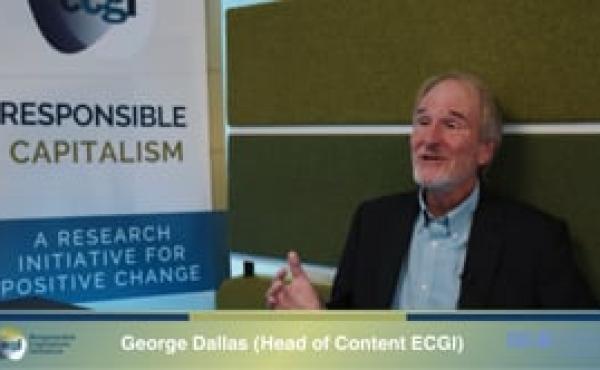Corporate Purpose
The purpose of business is to solve problems – problems that we face as individuals, societies, and the natural world. And to do it in a way that is commercially viable and profitable. This is a research pillar of the ECGI Responsible Capitalism initiative.

Business is increasingly realising that its purpose is not simply to profit. It is recognising that the means as well as the money matter - the source as well as the size of the profit matter. It matters whether business benefits from environmental degradation. It matters whether profits come at the expense of people. It matters whether shareholder value destroys societal values. And it matters because societal values can create shareholder value. Business knows this, investors know it, regulators know it and they are responding.
Professor Colin Mayer (September 2022)
January 2024
In January 2024, ECGI published a summary report from the 2023 conference. It is a comprehensive record of the panel discussions with a number of takeaways for those studying or working on the topic. Access the Report.
- Purpose needs to be clear and well understood throughout the organisation.
- It has to be focused; companies must be focused and ensure that the employees are engaged.
- The role of owners can be critical to determine purpose, especially if they are active owners with significant stakes in the company.
- Institutional investors have a critical role in monitoring and engaging with companies to evaluate if companies are fulfilling their purpose.
- The law may be better positioned to address negative externalities.
- Companies should report on purpose without waiting for perfect solutions.
- Metrics relating to social factors should be company specific, relating to the company’s individual sector and circumstances — with scope for flexibility.
- However, climate and environmental reporting should be more objective and absolute in scope. There needs to be a more elaborate system of measurement in this domain.
October 2023
ECGI published a second series of Blog articles on Corporate Purpose.
September 2023
Copenhagen Business School and ECGI organised a 3-day conference which convened leading international academics and business leaders to address the central questions relating to corporate purpose and explore its impact on capitalism and sustainability.
Moderators key takeaways from the panel discussions.
August 2023
ECGI published a compendium of research perspectives identifying key working papers that provide insight into the subject of corporate purpose.
From the network of ECGI Research Members, over 35 working papers have been published on corporate purpose since 2020. The majority of these are from legal scholars who collectively warn of tensions and the risk of superficiality/form over substance.

July 2022
ECGI published it's first series of blog articles on corporate purpose.
A selection of takeaways from papers highlighting a range of views:
- The 1980s takeover wave probably was a “critical juncture” that altered corporate purpose in a shareholder-oriented manner that may be unlikely to change for the foreseeable future. More
- We need a more comprehensive vision of the corporation that encompasses both private and public aspects and expands the role of company directors in monitoring corporate integrity and social impact; More
- Firms can generate social value while increasing their long-term economic value by adopting organizational and technological innovations, promoting sustainability, adhering to ethical standards, and incorporating corporate governance practices that align with environmental and human rights concerns, suggesting that a narrow focus on economic value alone is insufficient in capturing the full potential of a firm's impact and success; More
- Many large companies have embraced the concept and while legislative reforms in different countries have provided avenues for incorporating corporate purpose into company law, the demand for legally obligating companies to have a corporate purpose in their articles of association lacks support; More
- The interaction between industrial organization and purpose also carries political risks and can contribute to increased polarization and instability in society; More
- The presence of mission statements and green-activist investors is more likely in industries with prominent strategic complementarities; More
- Stakeholder pressure can be influential in firms with significant economic rents; More
- Relying on the discretion of corporate leaders to serve stakeholders can be an ineffective and counterproductive approach; More
- Evidence shows limited detectable effects on corporate purpose and decision-making; More
- A switch from shareholder value to enlightened shareholder value could create a false impression of stakeholder protection and hinder meaningful reforms; More
- Corporate leaders, despite expressing commitment to stakeholderism during the COVID-19 pandemic, failed to prioritize stakeholder interests in deal negotiations, demonstrating that their incentives primarily align with shareholder interests rather than broader stakeholder concerns; More
- The concept faces challenges of legitimacy and coherence in the corporate form; More
- Corporate law should enable the construction of a zone of insulation to protect a company's mission-purpose from immediate shareholder pressures; More
- Legally binding purpose statements for companies can enhance credibility and align objectives with shareholders. More
- A single change to corporate law, requiring companies to include a social or communal purpose alongside profit-making, is unlikely to transform corporate conduct without significant changes to shareholder-centric features of corporate law or a shift in how investors perceive their goals; More
- Purpose proposals foster stakeholder engagement; More
- Corporate purpose drives expectations, interests, transparency, accountability, through measures like charters and market forces' influence; More
- A periodic say-on-purpose vote could be debated with the integration of a more meaningful purpose report into CSR reporting, and the adoption of dual-purpose corporate forms could be considered in jurisdictions without benefit corporation models; More
- EU governance overlaps with benefit corporations' role; More
- It is important to recognise the diversity of corporate purpose models across jurisdictions, noting that Asia and Latin America’s economies have long embraced corporate purpose and stakeholderism; More
- The flexibility provided under law is effectively modified or constrained by the cultural, legal, and institutional environment that fiduciaries operate in; More
- Enforcement including market discipline, self-regulation, codes of conduct, disclosure and auditing, and both public and private enforcement are crucial; More
- Investment institutions cannot legitimately sacrifice their investors’ financial returns in connection with the installation of socially responsible business practices at operating companies; More
- There is no evidence suggesting that where they exist, broader fiduciary duties to stakeholders make much difference; More
- Recent institutional interventions in the name of ESG do not herald a structural shift toward a welfarist corporation; More
- Shareholder primacy cannot continue to provide a viable cornerstone for corporate legal theory. More
ECGI Corporate Purpose Pillar
Leadership Team
Programme aims and objectives
October 2022
ECGI Working Papers
More ECGI events and presentations on Corporate Purpose


























































